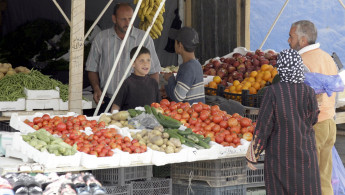The leftovers: spoiled fruit and veg for low-income Jordanians
Green grocers would put them in separate crates in hidden corners to avoid embarassing the poor.
This was in the past. But inflation and falling wages have forced many who would previously be seen as "well off" to buy discounted vegetables and fruits in this Brara category.
Today, there are shops that sell only low-quality produce, and they are extremely popular.
The sorting takes place in farms or storage warehouses, where low-quality produce is packaged and sent to Brara shops.
In the past, says Amjad Hamasha, civil servant, he would not even think about buying these semi-spoiled vegetables. "But poverty and the crazy rise in prices", as he said, forced him to become a regular buyer.
 |
Gone are the days when Jordanians were keen to pick the freshest fruits and vegetables |  |
"Merchants are greedy and the government is not serious about providing the bare minimum of decent life for the average Jordanian," she told The New Arab.
The prices of fresh produce increased dramatically over the past years, especially last summer, says Mohammad Qabbawi.
"Everyone is complaining but the government is handling things from behind desks," he adds.
Tomatoes and cucumbers are more expensive than apples, complains Um Nasser, retired civil servant. "We never expected a day would come where we have to buy fruits and vegetables per piece [rather than weight]."
Um Nasser admits that she now has to buy semi-spoiled vegetables to save money.
Condemnation of the government for failing to control prices is unanimous among those we spoke to.
"The government has not lifted a finger to rein in the greed of the merchants and the farmes," says Issa Khalaf.
"Monopoly and export to be blame"
But farmer Faraj Suwaylem stresses that producers sell their crops at low prices in the central market.
"Prices are reasonable if consumers buy directly from farmes," he claims.
Suwaylem points out that the sale prices are often barely enough to cover costs.
"Those who stand to profit are the intermediaries, retail sellers and exporters," he insists.
However, Yasser Badwan, green grocer, defends himself.
"We are dominated by major dealers and the government. Since there is no government oversight amid monopoly by some merchants, it is natural for prices to rise."
Yet the main reason for the inflated price of agricultural products, he says, is the focus on export without taking into consideration the interest of the average Jordanian.
Mohammad Obeidat, head of the Jordanian Consumer Protection Association, had called on Jordanians to boycott overpriced products and reduce their consumption if they want to balance their household budgets.



